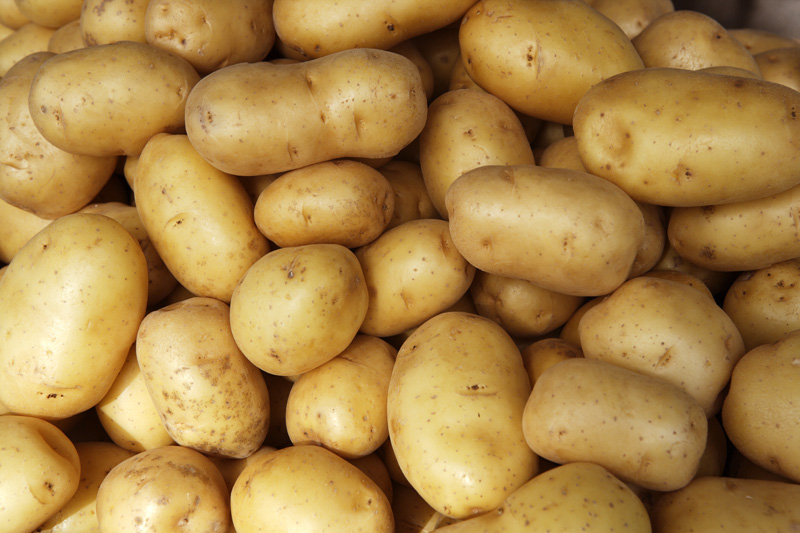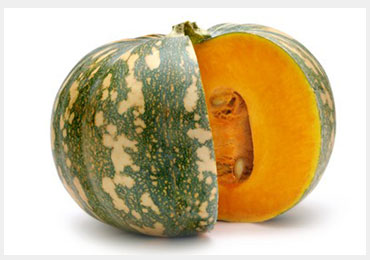BRISBANE: +61 7 350 36778 MELBOURNE : +61 3 994 84091 SYDNEY: +61 2 802 28423

Fresh potato
Fresh Organic Potato is the rich source of carbohydrate that gives instant energy to the body.
The potato is a starchy, tuberous crop from the perennial Solanum tuberosum of the Solanaceae family (also known as the nightshades). The word potato may refer to the plant itself as well as the edible tuber. In the region of the Andes, there are some other closely related cultivated potato species. Potatoes were first introduced outside the Andes region four centuries ago, and have become an integral part of much of the world’s cuisine. It is the world’s fourth-largest food crop, following rice, wheat, and maize.[1] Long-term storage of potatoes requires specialised care in cold warehouses.[2]
Wild potato species occur throughout the Americas, from the United States to Uruguay.[3] The potato was originally believed to have been domesticated independently in multiple locations,[4] but later genetic testing of the wide variety of cultivars and wild species proved a single origin for potatoes in the area of present-day southern Peru (from a species in the Solanum brevicaule complex), where they were domesticated 7,000–10,000 years ago.[5][6][7] Following centuries of selective breeding, there are now over a thousand different types of potatoes.[6] Of these subspecies, a variety that at one point grew in the Chiloé Archipelago (the potato’s south-central Chilean sub-center of origin) left its germplasm on over 99% of the cultivated potatoes worldwide.
Following the Spanish conquest of the Inca Empire, the Spanish introduced the potato to Europe in the second half of the 16th century. The staple was subsequently conveyed by European mariners to territories and ports throughout the world. The potato was slow to be adopted by distrustful European farmers, but soon enough it became an important food staple and field crop that played a major role in the European 19th century population boom.[7] However, lack of genetic diversity, due to the very limited number of varieties initially introduced, left the crop vulnerable to disease. In 1845, a plant disease known as late blight, caused by the fungus-like oomycete Phytophthora infestans, spread rapidly through the poorer communities of western Ireland, resulting in the crop failures that led to the Great Irish Famine. Nonetheless, thousands of varieties persist in the Andes, where over 100 cultivars might be found in a single valley, and a dozen or more might be maintained by a single agricultural household.[10]
The annual diet of an average global citizen in the first decade of the 21st century included about 33 kg (73 lb) of potato. However, the local importance of potato is extremely variable and rapidly changing. It remains an essential crop in Europe (especially eastern and central Europe), where per capita production is still the highest in the world, but the most rapid expansion over the past few decades has occurred in southern and eastern Asia. China is now the world’s largest potato-producing country, and nearly a third of the world’s potatoes are harvested in China and India.Health Benefits of Potato
All those naughty children around the world, who dislike eating any vegetable and hate them like anything, share another common interest. All of them like potatoes. This is the magic of the potatoes. You will hardly find anyone who dislikes them.
Weight Gain:
Potatoes are mounds of carbohydrates and contain little proteins too. This makes it an ideal diet for those lean and thins who desperately want to put on weight. The vitamins like vitamin-C and B-complex also help in proper absorption of this carbohydrate. That is why they make an inevitable part of the diet of Sumo Wrestlers.
Digestion:
Since potatoes predominantly contain carbohydrates, they are easy to digest and facilitate digestion. This property makes them a good diet for patients, babies and those who cannot digest hard food but need energy. But you must remember that eating too much of potatoes regularly may cause acidity in the long run. Potatoes also contain considerable amount of fiber or roughage, more in raw potatoes and cold ones than boiled or hot ones.
Skin Care: Vitamin-C and B-
complex and minerals like potassium, magnesium, phosphorus and zinc are good for the skin. Apart from that, pulp obtained from crushed raw potatoes, mixed with honey, can serve as excellent skin and face packs. This helps even curing pimples and spots on the skin. Again, this pulp, if applied externally on burns, gives a quick relief and heals fast. Smashed potatoes, even water in which potatoes are washed, are very good for softening and cleaning skin, especially around elbows, back of the palms etc.
Scurvy:
The vitamin-C present in potatoes can help prevent this dreaded deficiency disease, caused due to lack of vitamin-C. It is characterized by cracked lip corners, spongy and bleeding gums, frequent viral infections like cold etc.
Rheumatism:
There are two aspects of this factor. Vitamins, calcium and magnesium in potatoes help giving relief in rheumatism. Water obtained from boiling potato gives relief in rheumatism. But due to high starch or carbohydrate content it tends to increase body weight which may have adverse effects on rheumatic people.
Inflammation:
Potato is very effective in inflammation, internal or external. Since it is soft, easy digestible and has a lot of vitamin-C (very good anti-oxidant and repairs wears and tears), potassium and vitamin-B6, among others, it relieves inflammation of intestines and the digestive system. It is very good diet for those who have mouth ulcers. Again, raw smashed potato can be applied to relieve external inflammation, burns etc.
High Blood Pressure:
Since high blood pressure is caused due to a number of reasons, including diabetes, tension, indigestion, nature of food and many such, different are the cures. Potato can be used to relieve High Blood Pressure due to tension, indigestion etc. due to abundance of vitamin-C and B in it, but should be avoided if it is due to diabetes. The fiber present in it is helpful in lowering cholesterol and improves functioning of insulin in the body, which aids to lowering of blood pressure, since there is a direct relation between the blood pressure and the glucose level in the blood and insulin regulates this glucose level.
Brain Function:
Proper functioning of the brain depends largely on the glucose level, oxygen supply, some members of the vitamin-B complex and some hormones, amino acids and fatty acids like omega-3 fatty acids. Potatoes cater to almost all the needs mentioned above. They are high in carbohydrates and thus maintain good level of glucose in the blood which does not let brain fatigue creep in and keeps the brain active and alert. Next is oxygen which is carried to the brain by the haemoglobin in the blood and whose main constituent is iron. Potato contains iron too and thus aids to this function also. Next is the turn of vitamin-B complex. Here again, potato is rich in vitamin-B6 and contains traces of other members of this complex. In addition, it contains certain other elements like phosphorus and zinc which are good for brain too.
Heart Diseases:
Apart from the vitamins (B-complex, C), minerals and roughage, potatoes also contain certain substances called Carotenoids (lutein, zeaxanthin etc.) which are beneficial for heart and other internal organs. But again, since it raises the glucose level in the blood and over intake may cause obesity, which in turn can put a lot of pressure on your heart; hence it is not recommended for obese or diabetic people.
Kidney Stones:
Kidney Stones, also known as Renal Calculi, are caused mainly due to raised level of uric acid in blood. In such cases, high proteins should be avoided, particularly animal proteins such as meat, turkey, shrimps, sea fishes, eggs, milk etc. as well as spinach, raw plantain, black grams and certain beans, which drastically increase the level of uric acid in blood. Iron and calcium also help form the stone. Potato is rich in both of these and normally seems not fit from this point of view. But it is very rich in magnesium which resists accumulation or deposition of calcium (calcification) in the kidney and other tissues, thereby proving beneficial for treatment of renal calculi.
Diarrhea:
It is an excellent energy-rich diet for those suffering from diarrhea, since it is very easy to digest as well as contains mild roughage. But an over intake may cause diarrhea due to excess ingestion of starch.



